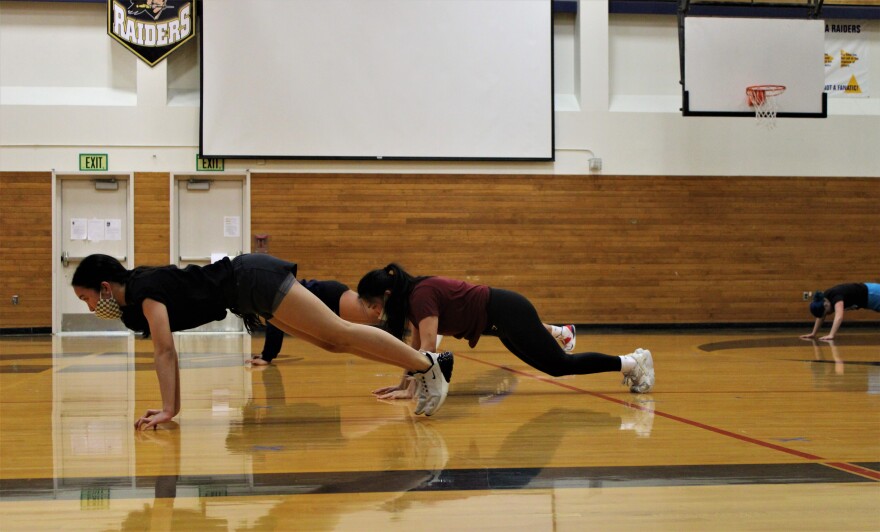A rhythmic beating followed by soft clapping and cheering echoes through the Unalaska high school gym. It's the sound of about eight high schoolers hopping across the gym floor on their toes and knuckles — bodies hovering just inches above the ground. They're practicing the "seal hop," a Native Youth Olympics event. It's an event many athletes thought they wouldn’t have the chance to practice together this year, due to the coronavirus pandemic.
Like last year, the NYO games are being held virtually. However, despite a late start to the season, 21 Unalaska student athletes returned to the gym this month for in-person practice.
The games began April 5 and will continue until the end of the month. The nine events that make up this year's games have been split into three weekly segments. Each week, athletes can compete virtually by submitting video recordings of themselves performing an event. The first week students competed in the Alaskan high kick, scissor broad jump and wrist carry. The second week they competed in the two-foot high kick, kneel jump and one-hand reach. And for the final week, they will submit videos for the one-foot high kick, seal hop and toe kick.

Of the 21 students participating this season, just over half are actually competing. Some chose not to simply because they didn't want to have to go through the hassle of recording and submitting competition videos, but many are excited to participate in practices anyway.
Kevin Tran is a senior this year and is one of the athletes who chose not to compete. He said being able to actually come to the gym and practice with his teammates, rather than just participating alone and sending in a video — like competitors had to do last year — has made a world of difference.
"I think I'm just fortunate to have the whole team here because it's my last year," Tran said. "And [last year] wasn't the same when it was just a camera. It just feels a lot better being in the gym."
Normally, Tran said he'd compete in the Indian stick pull and Eskimo stick pull, but both of those events were cancelled this year because they require close contact between competitors. Instead, the toe kick will be making its first appearance at the NYO games since 2015.
Like many of the other events, the toe kick requires agility, endurance and serious determination.
And according to senior Bladmher Mondina, it's also a little dangerous.
"It seems so scary because you might fall on your face or even fall back," Mondina said as he gestured and explained how to properly perform the skill.
Like Tran, he's not actually competing in the games this year, but he comes to practice anyway.
"I enjoy socializing with these people because I grew up with them," he said. "It's nice to have them around, being able to talk to them, give them some pointers and just see them have fun."

Normally, there would be about 40 kids participating. Even though turnout this year is much lower, this season's still been a challenge, according to Genee Shaishnikoff, who's been coaching NYO for about seven years.
"All the coaches are trying to learn this judging style and recording and getting everything right," she said. "Because normally they have all the judges and they're trained in doing that — we're just trying to be coaches, but now we have to be both."
In last year's virtual games, Shaishnikoff said students recorded and submitted their own competition videos with some help from volunteers and peers.
Shaishnikoff pulled out a scoresheet covered in tables and little bubbles for tracking measurements. She explained that the coaches have to help record the students doing their events, then have to also judge and score them — skills she said are totally new to her as a coach.
Preparing and submitting all of those materials has proven to be a time-consuming task, Shaishnikoff said.
"I was here on Saturday for four and half hours, trying to record the kids, then submitting the [recordings] and making sure [the officials] got them on time and getting the score sheets with the videos," she said.
Regardless of the extra work and time, Shaishnikoff said she's thrilled to have the kids back in the gym together, even if it's just to practice.
"I'm just happy — even if we weren't doing the virtual submissions — just to have them here in the gym, being able to practice and be together doing this," she said.
For several students, this is their first time participating, or they've had little experience actually practicing with others.
And while coaches have had to put on a few extra hats this year, the students have stepped up to encourage one another and offer support, an elemental part of the communal games.
Nikki Amora is a sophomore and this is her first time competing in the games. Because she joined late, Amora said she only got one practice prior to competing in her first event, which was the wrist carry.
Despite that, she took fifth place in the event and said she’s looking forward to this year as a chance to grow.
"I just kind of took this as an opportunity to work on myself and challenge myself and get prepared for next year," Amora said.
Herwin Riodil placed first in the scissor broad jump, and Lizzie Tran placed first in the two-foot high kick last week. Shaishnikoff said they are still waiting on results for the kneel jump and one-hand reach.
The student athletes are competing in the final round of events this week.






